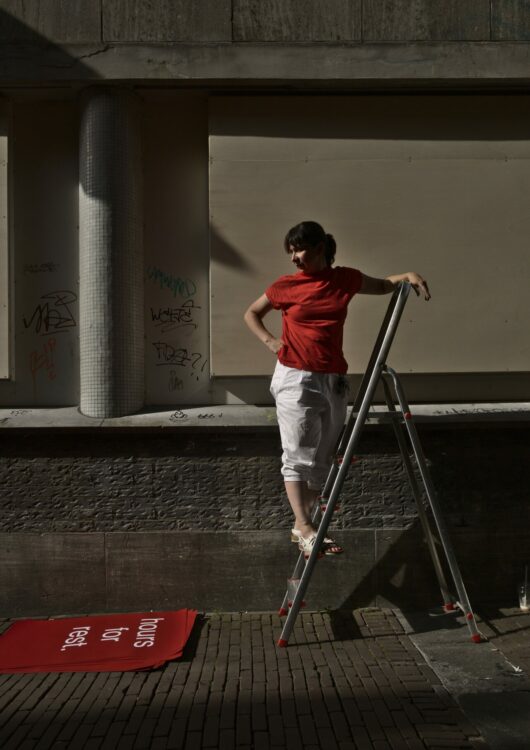This September we welcomed Alina Lupu as she moved into the AiR do do a one-month-residency at VHDG. She is no stranger to us, as she was a guest of ours in November 2021, as one of three artists on the evening program of HEDEN: Humor in Neushoorn, where she made quite the scene and put the moderator in a pretty tight spot. Alina’s practice deals with the topic of precarity within the arts. It’s a heavy topic to which she adds a bit of a twist, like this HEDEN evening. It was all in good fun though, proving that at the end of the day humour takes many shapes and it can be the only way out of the heaviness of talking about living and working conditions.
In the first week of September 2022, Alina has arrived in the AiR to do research and work on her project ‘Work, Rest, What We Will’. She will try to settle and to get to know Leeuwarden a bit better, and also to understand the relation of its citizens to work, rest and leisure.
In the first week of September 2022, Alina has arrived in the AiR to do research and work on her project ‘Work, Rest, What We Will’. She will try to settle and to get to know Leeuwarden a bit better, and also to understand the relation of its citizens to work, rest and leisure.
Alina Lupu is originally from Romania. She’s been living and working in Amsterdam for ten years now. She studied at the Rietveld Academy, and then she stepped into a job as a food delivery courier as her first professional position after graduation. She decided, at the time, to lean into her working precarity and find parallels between the position of cultural workers and people taking up zero-hour contracts and freelancing positions within the food delivery sector.
In one instance she blended her courier position and her position as an artist when she was invited, as an alumna, to speak at the Rietveld Academy. The audience, her former teachers, gazed in amazement when she appeared before them in a full delivery outfit, complete with the delivery bag. This action displays the tone her work would take during the rest of her artistic career. As she would often end up employing humor as a way to address contemporary issues, usually with a sharp edge.
It’s been six years since that stunt.
By now her practice has been shaped by further jobs on a cleaning platform, in a restaurant, multiple gigs within the arts, her precarious living condition, and volunteering for a free food market initiative. She’s used to always being aware of her context when working and, ultimately, the context shapes the final outcome of her artworks. To help her along, she’s putting together a library called the Art Workers Library, which is a living and growing organism that tries to accommodate ongoing conversations about the ties between work and art, as well as the ways in which life and work intersect. With this library as a starting point, Alina aims to investigate labour in the Frisian context during her stay here, but also ways in which one can escape the usual expectations of work and think about, for example, concepts such as “broad wellbeing”.
Some selections from the Art Workers Library include Working Aesthetics – Danielle Child; Mutual Aid – Dean Spade; The Hologram – Cassie Thornton; Wages against artwork – Leigh Claire La Berge; Art Workers – Julia Bryan-Wilson; The Problem with Work – Kathi Weeks; Entreprecariat – Silvio Lorusso; Inventing the Future – Alex Williams and Nick Srnicek; 24/7 – Jonathan Crary; Seasonal Associate – Heike Geisler; Artists at work – Bojana Kunst; The Educated underclass – Gary Roth; Student revolt – Matt Myers.
After the residence in September, there will be a moment in 2023 in which Alina Lupu will present her findings to the public.
Foto: Jörn Nettingsmeier
